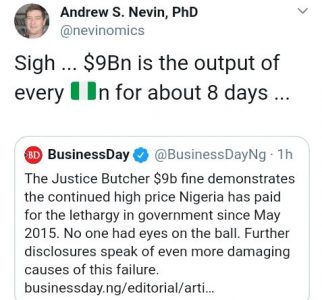Business
$9bn fine is the output of every Nigerian for 8 days – Dr Nevin

Andrew S. Nevin(PhD), Partner & Chief Economist, at PwC has noted that the $9 billion award against Nigeria in favour of a British engineering firm, Process & Industrial Development Limited (P&ID) by British Business & Property Courts, is the output of every Nigerian for about eight days.
Nevin wrote on his twitter handle that ” … $9Bn is the output of every Nigerian n for about 8 days.”

Nevin’s tweet
It would be recalled that the British Business & Property Courts, presided by Justice Butcher had few days ago, granted P&ID enforcement request to enforce a March 20, 2013 award against Nigeria by a District Circuit Court in Washington DC, an award which converts the arbitration award into a domestic UK judgment against Nigeria.
The company which accused the Nigerian government of breaching a January 2010 gas contract agreement, was initially awarded $6.6 billion as damages. But the tribunal said the damages were calculated as the present value of 20-year income, minus certain capital and operating costs incurred from building and running the refining facility.
The award was handed by a tribunal constituted under the rules of the Arbitration Act 1996 (England and Wales) and the Nigerian Arbitration and Conciliation Act (CAP A18 LFN 2004).
Nigeria did not appeal the initial judgement. The award subsequently rose to about $8.9 billion including an additional $2.3 billion in accumulated interest at 7 percent rate per annum.
Meanwhile, the Nigerian government had last week, said it was weighing options to resist the decision of the British court.
The Permanent Secretary and Solicitor General of the Federation, Dayo Apata, who reacted to the judgement in a statement, last Friday in Abuja, said that the government will defend Nigeria’s rights to protect its people’s assets around the world against the enforcement of the judgment.
He said, “Nigeria intends to strongly avail itself of all defences customarily afforded to sovereign states under the United Kingdom Sovereign Immunity Act at any such enforcement actions.”
Apata noted that the country decided to resist the judgement based on experts’ report, which analysed the damages awarded P&ID as being “clearly unreasonable and manifestly excessive and exorbitant.”
He argued that the courts “went far beyond any legitimate protection of the commercial interests to overcompensate P&ID on a, frankly, gargantuan scale, and impose[d] a punitive award on Nigeria”.
Apata said the ruling was “completely wrong and obviously unjustifiable,” noting that Nigeria government’s counsel has been instructed to pursue an appeal on the judgment of the English Court to secure a stay of execution, apart from other efforts in the courts of the United States of America to protect Nigeria’s interests.
“Nigeria is making vigorous efforts to defend its interest in this matter and would not relent in exploring every viable option in doing so,” he said.
Meanwhile, the Attorney General of the Federal, Abubakar Malami has vowed that those who masterminded the signing of the contract will be dealt with.
The problem had started when on January 11, 2010, P&ID signed a gas supply and processing agreement with the Ministry of Petroleum Resources on behalf of the Nigerian government.
Under the terms of the agreement, P&ID was to build and operate an Accelerated Gas Development project to be located at Adiabo in Odukpani Local Government Area of Cross River State.
The federal government was to source natural gas from oil mining leases (OMLs) 123 and 67 operated by Addax Petroleum and supply to P&ID to refine into fuel suitable for power generation in the country.
Nigeria was expected to supply an initial volume of about 150 million cubic feet of gas per day. Eventually, it was to be ramped up to about 400 million cubic feet per day during the 20-year period.
However, P&ID alleged that after signing the agreement, the Nigerian government reneged on its obligation after negotiations were opened with the government of Cross River State government for allocation of land for the project.
The company said the failure to construct the pipeline system to supply the gas frustrated the construction of the gas project, thereby depriving it of the potential benefits from over 20 years’ worth of gas supplies.
The company said attempts to settle out-of-court with the Nigerian government failed.






